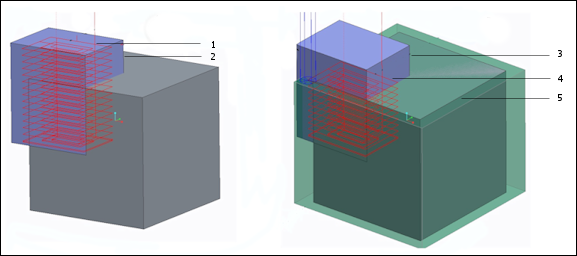About Volume Milling
A Volume milling NC sequence removes the material inside a Milling Volume slice-by-slice. All slices are parallel to the retract plane; the axial depth of cut (slice depth) is defined by the combination of STEP_DEPTH and WALL_SCALLOP_HGT parameters. The first slice is generated at slice depth below the top of the mill volume. In case the mill volume extends above the top of the workpiece, the first slice is generated at slice depth below the top of the workpiece, to avoid air machining. All planar surfaces inside the volume that are normal to the Z-axis of the NC Sequence coordinate system produce additional slices across the whole volume; use the MIN_STEP_DEPTH parameter to control the minimum acceptable distance between slices. The step-over distance inside a slice can be controlled by the following parameters: STEP_OVER, NUMBER_PASSES, BOTTOM_SCALLOP_HGT, and STEPOVER_ADJUST.
|
|
If a nonzero PROF_STOCK_ALLOW is specified (or a BOTTOM_STOCK_ALLOW value is supplied), it will affect the depth of the last slice and of all the slices over horizontal surfaces.
|
The following graphic illustrates the depth of the first slice for Volume milling. The model shown on the left has no workpiece geometry. The first slice (1) is at slice depth below the top of mill volume (2). The model shown on the right has a workpiece. The first slice (4) is at slice depth below the top of the workpiece (5).

Some typical applications for Volume milling are:
• Facing down the workpiece
• General material removal on the outside of the workpiece
• Rough milling of a vertical slot or cut, or a blind slot with islands
• Pocket finishing by using the ROUGH_OPTION parameter value PROF_ONLY